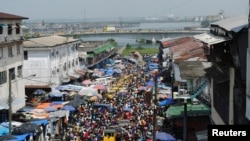A new study by the United Nations Development Program finds the Ebola epidemic is dramatically setting back prospects for economic development in Liberia, Sierra Leone and Guinea. The study urges recovery plans for West Africa’s three Ebola-affected countries to begin now and not to wait until this deadly disease is contained.
Over the past 10 years, Liberia and Sierra Leone have enjoyed a so-called peace dividend. After years of civil war, the prospect of economic development in these countries was looking up. A similar situation had begun to unfold in Guinea after years of unrest.
Then Ebola struck and these bright scenarios came crashing down. The chief economist at the U.N. Development Program's Regional Bureau for Africa, Ayodele Odusola, says the devastating impact of Ebola has caused a breakdown in trust between these governments and their people.
Weak health systems
In an exclusive interview, he tells VOA that one of the reasons it is so difficult to contain the deadly virus is because the people no longer believe what their leaders tell them. He says other reasons include the fragility of the countries' health systems, a lack of health care workers, and cultural practices that often accelerate the spread of Ebola.
He says the Ebola crisis will have a serious and long-lasting impact on these countries' economies. He says the outlook is particularly bad for Liberia and Sierra Leone, which have been among the fastest growing countries in the world over the past 10 years.
“For instance, Liberia is going to record its first negative growth trend in 2014, which we estimate to be something as high as minus 1.8 percent negative growth, which is very serious," he said. "And, again, Sierra Leone alone too is going to lose six percentage point growth, from close to about 12 percent now coming to just less than six percent, which is really an issue.”
Odusola says Guinea’s economy is not on a par with the other two countries. But, it too is expected to record a negative growth rate in 2014.
Economic impact
The UNDP report finds the Ebola crisis in West Africa has resulted in job losses, rising food prices, and agricultural disruption. It notes that sharp drops in the use of health and education services are likely to increase poverty, child and maternal mortality, and facilitate the spread of HIV/AIDS and malaria, particularly for the rural poor.
Though the Ebola epidemic is far from over, Odusola says recovery programs must begin now and not wait until the crisis is over.
“If you wait until that, the long-term impact will be so serious for these three countries to manage," he said. "Apart from the fact that we devote strategic attention to address the root causes of this crisis, the Ebola crisis, we need to really have specific plans…to look at the key sectors that are badly affected, especially farming, farming activities and a host of other ones…There should be substantial support to farmers, incentives for them to really go to the farm and plant so that there will be a harvest in the next harvesting season to take care of the shortages over the past one year.”
The report calls for an immediate effort to revive local economies and to provide social safety nets for the most vulnerable, such as orphans and women who have no livelihoods.




